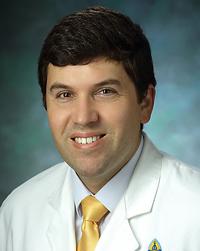Research Lab Results
-
Seth Blackshaw Lab
The Seth Blackshaw Lab uses functional genomics and proteomics to rapidly identify the molecular mechanisms that regulate cell specification and survival in both the retina and hypothalamus. We have profiled gene expression in both these tissues, from the start to the end of neurogenesis, characterizing the cellular expression patterns of more than 1,800 differentially expressed transcripts in both tissues. Working together with the lab of Heng Zhu in the Department of Pharmacology, we have also generated a protein microarray comprised of nearly 20,000 unique full-length human proteins, which we use to identify biochemical targets of developmentally important genes of interest. -
Seth Margolis Laboratory
The Seth Margolis Laboratory studies the signaling pathways that regulate synapse formation during normal brain development to try to understand how, when these pathways go awry, human cognitive disorders develop. We use Ephexin5 to study the molecular pathways that regulate restriction of excitatory synapse formation and their relevance to the pathophysiology of Angelman syndrome.
-
Seth Martin Lab
Dr. Martin's research is focused on rapid generation of new knowledge through clinical studies that can be brought back to the bedside to directly inform the care of patients with advanced lipid disorders and those in need of state-of-the-art comprehensive CV prevention. Members of his lab commit to complete ownership of their project, unwavering pursuit of excellence, and thrive on multidisciplinary teamwork. Active projects include the Very Large Database of Lipids, CASCADE FH Registry, MiCORE (Myocardial infarction, COmbined device, Recovery Enhancement), Google Health Search Trial, and mActive-Smoke. For more information, please visit the Ciccarone Center.
-
Sevil Yasar Lab
Research areas in the Sevil Yasar Lab include dementia, cognitive decline, hydrocephalus and pharmacoepidemiology. Recently, we studied the ability of fatty acid amide hydrolase (FAAH) inhibitors to block the rewarding effects of nicotine in squirrel monkeys.
-
Seydoux Lab
The Seydoux Lab studies the earliest stages of embryogenesis to understand how single-celled eggs develop into complex multicellular embryos. We focus on the choice between soma and germline, one of the first developmental decisions faced by embryos. Our goal is to identify and characterize the molecular mechanisms that activate embryonic development, polarize embryos, and distinguish between somatic and germline cells, using Caenorhabditis elegans as a model system. Our research program is divided into three areas: oocyte-to-embryo transition, embryonic polarity and soma-germline dichotomy. -
Shanthini Sockanathan Laboratory
The Shanthini Sockanathan Laboratory uses the developing spinal cord as our major paradigm to define the mechanisms that maintain an undifferentiated progenitor state and the molecular pathways that trigger their differentiation into neurons and glia. The major focus of the lab is the study of a new family of six-transmembrane proteins (6-TM GDEs) that play key roles in regulating neuronal and glial differentiation in the spinal cord. We recently discovered that the 6-TM GDEs release GPI-anchored proteins from the cell surface through cleavage of the GPI-anchor. This discovery identifies 6-TM GDEs as the first vertebrate membrane bound GPI-cleaving enzymes that work at the cell surface to regulate GPI-anchored protein function. Current work in the lab involves defining how the 6-TM GDEs regulate cellular signaling events that control neuronal and glial differentiation and function, with a major focus on how GDE dysfunction relates to the onset and progression of disease. To solve these questions, we use an integrated approach that includes in vivo models, imaging, molecular biology, biochemistry, developmental biology, genetics and behavior. -
Shaoyong Yu Lab
The Yu Lab does basic and translational research on Sensory physiology and disorders of the gastrointestinal tract.
-
Sharon Turban Lab
Research in the Sharon Turban Lab focuses on the effects of sodium and potassium on blood pressure and on kidney function. We lead the Chronic Kidney Disease-Potassium (CKD-K) clinical trial, funded by American Heart Association, which examines the benefits and safety of two levels of potassium intake in patients with kidney disease. Other research includes the Chronic Renal Insufficiency Cohort (CRIC) study, which aims to improve the understanding of chronic kidney disease and related cardiovascular illness.
-
Shawn Lupold Laboratory
The Shawn Lupold Laboratory studies the biology of urologic malignancies, like prostate cancer, to create new experimental diagnostic, prognostic and therapeutic agents. -
Shelby Kutty Laboratory
Shelby Kutty, M.D., Ph.D., is an authority on cardiovascular imaging, including echocardiography, magnetic resonance imaging and computed tomography of congenital heart disease. His areas of academic interest have focused on myocardial function assessment, therapeutic ultrasound and cardiovascular outcomes. Kutty’s research includes developing new imaging technology applications such as a smartphone application that uses patients’ echocardiographic images to track their progress. His work gives pediatric cardiologists better ways to predict outcomes in their patients and provide the most effective and appropriate treatments.




